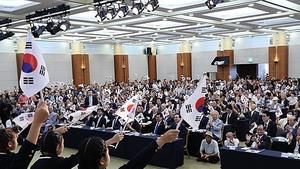
South Korea: Independence Fighter Groups, Opposition Boycott Liberation Day Ceremony
The Heritage of Korean Independence (HKI), a state-funded association of independence fighters and their descendants, held a separate ceremony at Hyochang Park in central Seoul, joined by other independence activist groups and opposition party lawmakers, Yonhap news agency reported.
It marked the first time independence-related groups held a separate Liberation Day ceremony from the government-organised one.
The move came as the groups and opposition parties have called for the resignation of Kim Hyoung-suk, the newly appointed president of the Independence Hall of Korea, accused of holding pro-Japanese views.
"Recently, distortions of the truth and base historical perceptions stained with pro-Japanese views have spread, placing our society in confusion," HKI chief Lee Jong-chan said at the ceremony. "The HKI could not just watch this regression and damage to history."
The HKI has accused Kim of being a "New Right" figure who called for designating August 15, 1948, when South Korea's government was established, as national foundation day.
Lee argued that creating a national foundation day would undermine the history of Korea's independence movement and legitimise Japan's 1910-45 colonial rule of Korea.
Kim's past remarks alleging South Korea came into being when its government was established in 1948 led to suspicions his appointment was a precursor to designating the date as National Foundation Day, despite the government's repeated denials.
The question of when South Korea came into being has long been a subject of ideological debate, with some arguing it was April 11, 1919, when a provisional government was established during Japan's 1910-45 colonial rule of the Korean Peninsula.
Korea achieved independence from Japanese colonial rule on August 15, 1945, following Japan's surrender in World War II.
The main opposition Democratic Party (DP) and other minor parties also boycotted the government ceremony, with Rep. Park Chan-dae, floor leader of the DP, and Rep. Cho Kuk, leader of the minor Rebuilding Korea Party, attending the HKI event.
Meanwhile, the ruling People Power Party earlier said the calls for Kim's resignation and ceremony boycotts were political manoeuvres that weakened the meaning of Liberation Day.
"If we truly consider the meaning of liberation, we must not split the national Memorial Day in two," a PPP spokesperson said in a commentary.

Legal Disclaimer:
MENAFN provides the
information “as is” without warranty of any kind. We do not accept
any responsibility or liability for the accuracy, content, images,
videos, licenses, completeness, legality, or reliability of the information
contained in this article. If you have any complaints or copyright
issues related to this article, kindly contact the provider above.

















Comments
No comment